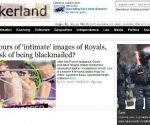Archive: Queen’s Jubilee: a massive psychological operation
First published at Luikkerland, June 2012
The massive psychological operation perpetrated upon the British people by the Establishment, whereby unanimous exultation of the Monarch is portrayed in the corporate-media, has moved into a sweep-up and consolidation phase this weekend. A dubious Ipsos MORI opinion poll claims that 90% of Britons, despite the fact that that many people cannot understand what it is the Queen does for a “living”, are happy with the way that she is doing her “job”.
In terms of the Establishment’s grand exercise to convince Britons that they are a happy people with their ever decreasing lot, and that there is no chance that the ruling elite, which is in fact crushing them, can be overthrown, whereas the high-saturation media coverage of so-called Jubilee celebrations provided visual and descriptive evidence of solidarity under the status quo, the statistics are being used to add pseudo-scientific support to that perception.
Indeed, the Queen’s jubilee is only one part of a bigger scheme of bread and circuses being offered to British people by the British Government to divert their attention away from the hardships being created by the programme of robbery and dispossession being waged against the population through the controlled implosion of the economy. With the use of the austerity scam, which is a process of swapping out real wealth from the middle classes for bankster invented fiat debt, and other policy that persecutes a displaced generation of Britons whose self-employment is being made to fail, and whose access to work is being shut down by an influx of cheap foreign labour, the British Government is deliberately trying to impoverish the electorate to make it dependent on welfare and government diktat.
That Britain’s long decline is a reality, and that Britons can see it as such, is reflected in another poll that appeared before Jubilee events began. In an ITV/ComRes, 47 percent of those surveyed thought that Britain was not as good a place as before the Queen’s reign.
Such a statistic is hard to reconcile with the headline Ipsos MORI figure, and perhaps does signify a huge lack of understanding in what the Queen, as the supposed protector of English law, is actually supposed to do in her “job”. As critics would point out, signing away British sovereignty to foreign powers in a series of international treaties is not doing a good job in any fashion imaginable.
The disparity could also call into question the validity of the Ipsos MORI poll, and be a cause to suspect that it merely forms a tail-end to a huge act of propagandising to shape public opinion about the traitorous Monarch. Reasons to be sceptical also stem from the fact that Ipsos MORI carried out a poll in 2011 which claimed that 56% of Britons would watch the wedding of William Saxe-Coburg-Gothe and Kate Middleton on television. At the same time, snap-polls for the “This Is” online presence of many local newspapers were showing that in some places, up to 74% of respondents had no interest in the event.
Several investigations at this site have indicated that opinion polls are strictly not to be trusted as they can quite easily be manipulated to create the exact result desired by the commissioning agent.
The corporate-media coverage of supposed support for the Queen as represented by participation in celebrations is also not to be trusted. The official figure, as of 5th June, states that just above 9500 street parties were held over the four days directed by Government to be used to exult the Queen. During that period, the Daily Mail presented a narrative through a story, that was published on 1st June and updated until the 3rd, with the headline, “Diamond Jubilee: Britain goes crazy for Queen’s special party”. The Mail story maintained that there had been 10,000 applications to local authorities across the country to stage a street party, but the crucial number was 6500 (which could have been up to 5% less than that in the final equation) – which was the number of roads that were going to be closed off to stage such events.
This figure of 6500 (or less) is only about 1000 more than the number of streets that were closed down over a much shorter duration for the wedding of William and Kate in 2011, and 5500 street parties was considered to be a disappointment. Indeed, the BBC remarked “why so few street parties?” and noticed that the statistics were miniscule compared with attendance at Silver Jubilee celebrations in 1977.
Another notable detail is how, in the above mentioned Daily Mail article, the writers failed to give a breakdown of the spread of street party celebrations across the country in the way the publication had done for the 2011 royal wedding (granted, the missing information could have appeared at another time, elsewhere). Although the paper invited readers to send in pictures of their own organised block parties, it could only publish scenes from what looked like no more than 7-8 different locations in which the huddled masses crouched over trestle-tables as if they should be grateful to Her Glorious Majesty for the opportunity to eat.
In yet another tell-tale sign of the downright unpopularity of the Jubilee “celebrations”, while a separate survey printed in the Telegraph told of how “a quarter of people in Britain attended one of the thousands of events, large and small, across the country to mark the 60th anniversary of the Queen’s accession to the throne”, just over a half of the respondents to the aforementioned ComRes poll (which equates to just over 1000 people) said they would not go to a Jubilee street party or other celebration at all.
Yet what must finally undermine the propaganda exercise was the reaction is Scotland where only 60 street parties were held. Indeed, in an article by a Guardian Comment is Free writer, Mike Small, the Jubilee was declared a failure in terms of its being a perception shaping exercise. As Small explained, the scenario “presents a real problem for the narrative of [British] national unity” – which is a false reality that worship of the Queen is supposed to conjure, although it is mostly meant to exist in the minds of Britons as a psychological barrier of denial in the face of the loss of their ancient birth rights. As the EU becomes their real sovereign, and the Queen, in her private-corporate true identity, profits by it, both the Scottish and the English are supposed to be fooled into misidentifying the Queen as a benchmark against which they can test where their loyalties should lie.
However, as many of the restraints to England’s prosperity – fixed purposefully there by the ruling elite – may be stripped away if Scotland were to leave the union (because the LibLabCon dynamic would no longer be feasible), that the Scots are clearly at a more advanced stage in terms of wanting to discard a Great British identity must be of grave concern to England’s prison guards in the palaces of London. In terms of Scotland’s relation with the private-corporation that has intrinsic ownership of the British Isles, that the Queen is explicitly more illegitimate in Scotland than she is in England, where people are unaware that the English Crown has properly been abolished as a precedent in English law, is probably a major contributory factor to the rampant, obvious, apathy demonstrated by the large scale failure to engage in the Establishment’s psychological operation.
Queen job satisfaction level
A quarter of the people to take part in Jubilee
British people go Jubilee crazy: Daily Mail coverage
Daily Mail coverage, 2011 wedding
Britain is worse under Elizabeth
Propaganda fails in Scotland
BBC: why so few parties?
FBEL Archive: Friday night match result: British Public 1 Big Society 0


















